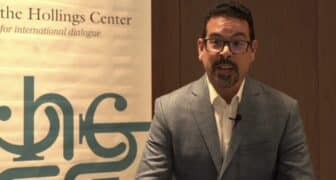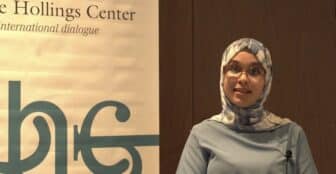
Speakers Randa Slim and Harith al Qarawee, along with Hollings Center staff George Gavrilis and Sanem Guner, listen to a participant at our recent event with TESEV.
A Discussion on the Lastest Developments in Iraq and Syria
Please click here for a printer-friendly PDF version of this page.
The Hollings Center for International Dialogue and the Turkish Economic and Social Studies Foundation (TESEV) co-organized a workshop on Iraq and Syria, featuring Harith al Qarawee, scholar and writer from Iraq and Randa Slim, a Lebanese-American political analyst with long-term experience in Track-II dialogue. The discussions were enriched by the participation of journalists, scholars, students and policy experts from Turkey, the Middle East and the United States. The event took place in the wake of continuing protests in Iraq’s Anbar province and the Syrian Deputy Prime Minister and Foreign Minister Walid al-Moallem’s visit to Moscow. There was much discussion of the interplay between Iraqi domestic dynamics, developments in Syria and Turkey’s role in both cases.
Baghdad-Erbil tensions over KRG’s international oil deals take the fore in discussions on Iraq and have led to a military showdown between the KRG and the Iraqi central government recently. But the hidden story behind this disagreement is that both sides were preparing for what might happen in Syria. The central government deployed troops to the north because it feared repercussions from Assad’s probable fall, ensuing uprisings and possible spill-over into Iraq’s Sunni areas in the Syrian border. This was a move to win over the Sunni population, but it backfired when Prime Minister Maliki put his Finance Minister Issawi under house arrest. Whatever sympathy Maliki garnered initially from the Sunni population was lost, and this triggered the protests in Anbar. Sunnis missed the chance of an Arab Spring-style social movement because the sectarian divide became the central theme in the protests rather than Sunni demands for political inclusion.
On the foreign policy front, the group was eager to discuss the Iraq-Iran-Turkey triangle. There was some criticism of the view that Iraq is acting as a proxy of Iran – especially in its positioning on the Syrian crisis. This view was described as simplistic and unjust to the complex social and political makeup of Iraq. If anything, Iran and Iraq (Qom and Najaf) are competitors on spiritual leadership of Shias, and thus not natural allies by virtue of sectarian alliance as many might think. In fact, Turkey was the most favored regional power between 2004-2008, until it started to come across as sympathizing more with Iraqi Sunni Arabs. Still, one participant noted, Turkey has a chance to cultivate good relations with the whole of Iraq, and does not need to follow Saudi Arabia’s role of being the Sunni patron in the region.
This point tied into the discussion on Syria. Turkey had initially come close to emerging as the lead mediator in the first months of the conflict by virtue of having close ties with the Syria government in the past and given trade ties with Syria. However, as fighting in Syria came closer to Turkish borders and as refugees poured out of Syria, Ankara became more insistent that Assad must go. Turkey’s PM Erdogan was personally offended that Assad had misled him on his willingness to reform and make concessions, but as one Lebanese participant noted, “There is no need to make it personal. Assad has been lying to Arab countries for years.”
The current state of play in Syria is a stalemate and neither side is ready to move towards a negotiated solution. However, there are rumors of disagreements among higher ranks in the regime about whether negotiations should begin with the Syrian National Council. In any event, there are three scenarios for Syria’s future:
- Protracted stalemate: Opposition controls the north, while Assad controls the coast, Damascus and parts of Aleppo. This would mean a de facto division of the country;
- Live and let live: Opposition victory in Damascus and Aleppo, but regime consolidation on the coast with Hezbollah’s help, forming liberated areas for Alawites, as in the South Lebanon “live and let live” model;
- Somalia on the Mediterranean: Defeat of Assad and entourage, but no emergence of a new Syria due to lack of a united opposition; emergence of smaller state-like structures and possibly warlords.
Though all of these scenarios are discouraging for all neighbors of Syria, the last one would be extremely worrying for Turkey as Turkey does not want to see a failed state on its borders.


